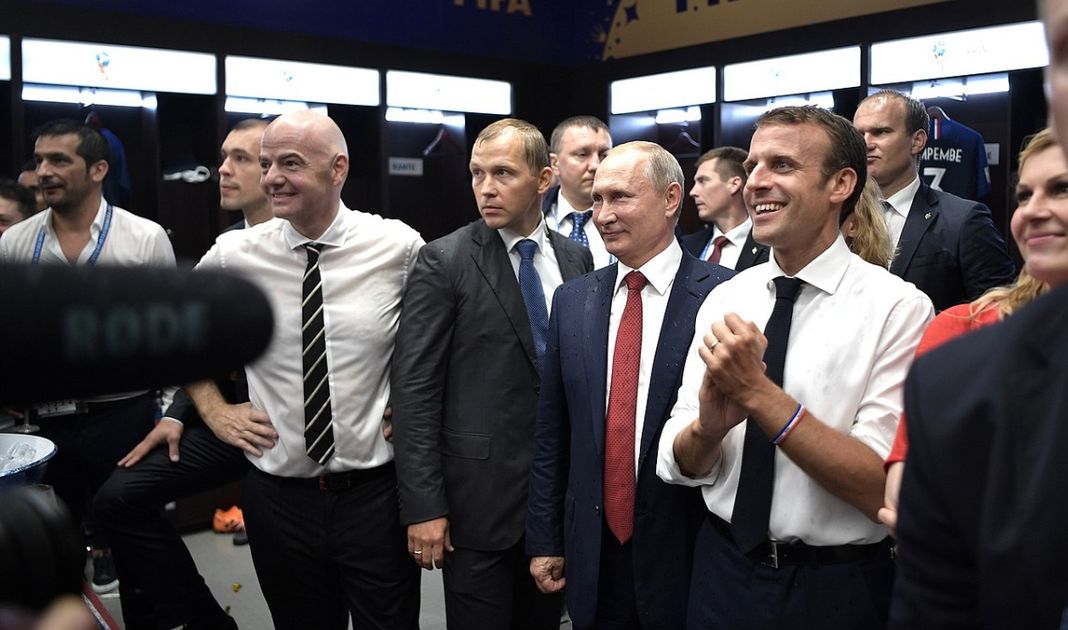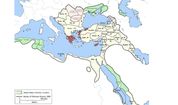Intermarium Weekly 12-18.08.2020

(commons.wikimedia.org)
Fallout from disputed Presidential elections in Belarus
Strikes are planned at the country’s biggest factories, which according to Lukashenko will undermine an already-struggling economy, making for dire long-term consequences. These workplaces are seen as the main battleground in the upcoming struggle between the government and an opposition which has more support amongst intelligentsia, small business owners and young cosmopolitans.
Foreign interference has been a running theme for Lukashenko. He argues that NATO forces are conducting military exercises near the country’s western borders. For Lukashenka this is an additional element in the political game for his struggle for survival as political leader of the country. So he is raising the stakes and ready to bring Belarus to the edge of geopolitical rivalry simply in order to stay in power.
Representatives of the Catholic Church have also come under fire from the regime. Belarus has over 1,500,000 Catholics in a country of just over 9,000,000. At the same time, detained members of the Wagner Group have been returned to Russia, signalling a willingness to tolerate foreign interference from the East.
The spectre of Maidan and its aftermath is another of Lukashenko’s regular motifs. He does not see himself as an ordinary politician but rather as the “father of the nation” and — unlike Viktor Yanukovich — claims he would rather die than hand over power to Polish- and Lithuanian-backed oppositionists. A key part of this vision is that law enforcement agencies are a defender of social order in the country.
“You will be beggars, you will walk with an outstretched hand and ask for a piece of bread, which today we can make ourselves.” This is a veiled Maidan reference and one that might play into people’s insecurities. IMF figures for GDP per capita (PPP) released in 2019 show Belarus on $21,000 (on a par with the People’s Republic of China), Ukraine on $10,000 (on a par with the Philippines).
Lukashenko on the Intermarium concept
Lukashenko does not see Belarus as part of a chain from Vilnius to Kyiv: “I already experienced this after the collapse of the Soviet Union, when there was an attempt to create the Baltic-Black Sea region – a sanitary zone: three Baltic states, Belarus, Ukraine, in order to separate Russia from the West. … we do not want to be a latrine and sanitize someone, to be a cordon sanitaire. And we understand what this can lead to. Therefore, we agreed with the President of Russia that we will act here in cooperation [to prevent such actions].”
Belarus stays the course on diversification (for now) – oil and otherwise
A tanker carrying 76 thousand tonnes of “White Eagle Blend” — a crude oil mixture, specially developed as an analogue of Russian Urals for European refineries — arrived at Klaipeda port on 9th August. On 13th August the first train with crude arrived at the Novopolotsk refinery in northern Belarus. It is planned that the entire consignment will be delivered to the Naftan refinery in August. The refinery has experience refining oil from Venezuela, Norwegian “Johan Sverdrup,” Arab Light oil from the United Arab Emirates, and American Bakken.
The Belarusian Ministry of Foreign Affairs is actively engaging with western counterparts. This week Vladimir Makei has spoken with the foreign ministers of Lithuania and Switzerland. They declared that Minsk is committed to maintaining communication and continuing dialogue with the European Union. This can be understood as a signal that if the regime survives, they (currently) intend to continue with the strategy of diplomatic diversification.
Belarus and China signed an agreement on cooperation in the agricultural sector as part of the Belt and Road initiative. The aim is to organize joint ventures for milk, dairy, cattle and meat products. According to representatives, the cooperation between Belarus and China is strategic and comprehensive. Trade and economic relations between the two countries reached a historical maximum in 2019 in turnover of goods and services. Cooperation in the agro-industrial complex is also actively developing. Already in the first half of 2020, the export of Belarusian food to China amounted to $110.9 million, which is 2.7 times higher than in the same period last year. More than half of Belarusian food exports to the Chinese market (52.5%) is made up of deliveries of meat products. In six months this amounted to more than 18 thousand tons for $58 million. More than 85 thousand tons of dairy products have been shipped to China this year for $32.5 million.
Putin, Lukashenko and the Military Factor
On 15th August, Lukashenko held a phone call with the Russian President. Later he clarified the details in front of the Center for Strategic Management in the Ministry of Defense. He said that at the first request, Russia will provide comprehensive assistance to ensure the security of Belarus in the event of external military threats. This is consistent with their obligations under the membership of the NATO-like Collective Security Treaty Organization (CSTO).
Interestingly, the concept of foreign interference is quite broad and can be interpreted as cyberattacks or the support for specific elements in the country from abroad. “When it comes to the military component, we have an agreement with the Russian Federation within the framework of the Union State and the CSTO. These are the moments that fit this agreement. I must say, I was even somewhat surprised – he is absolutely informed as to what is happening. And we agreed with him: at our first request, comprehensive assistance will be provided to ensure the security of the Republic of Belarus.”
On 18th August, Putin had a phone call with his French counterpart Emmanuel Macron where he emphasized the inadmissibility of external pressure on the leadership of Belarus. Additionally, Lukashenko ordered the transfer of the Vitebsk Airborne Assault Brigade to Grodno, in the immediate vicinity of Poland, Lithuania, and the strategically salient Suwałki Corridor, beyond which, Minsk argues, there is a “build-up of the military component.” NATO has denied the claim.
The strategy and plight of the Belarusian opposition
The first half of the week was very hot — in every sense of the word — with violent clashes taking place throughout the country. For Belarus, these events have been unprecedented in terms of scale and the level of violence used in response. Thousands were detained and injured, several people have died. At the same time, opposition media also reported that many police and military units refused to use force against the protesters.
The main opposition candidate Svetlana Tichanovskya has delivered several statements in which she calls on all sides to stop the violence and urges protesters to stay away from the streets. The Belarusian diaspora in the West is trying to collect funds in order to help injured protesters and push governments in the region for a more rigid policy against the Lukashenko regime. In order to deter the surge of protests, the authorities turned off the entire internet in the country.
After an initial aggressive stage, the nature of protests evolved into a new dimension. In the second half of the week, massive trades union strikes commenced in protest against the regime, demanding new and fair elections. Tikhanovskaya’s headquarters appealed to Belarusians – “Urgently create strike committees in your city.” This kind of scenario is undesirable for the regime and for Russia because many strategically important industrial centers are located in Belarus. Moreover, she demanded from the authorities to start a dialogue and announced the creation of a Coordination Council.
The EU, the US and a divided response?
The European Union does not recognize the results of the elections and intends to impose sanctions against the Belarusian officials responsible for the brutal suppression of mass protests following the presidential elections. The EU plans to impose penalties against “specific individuals who are known and have committed crimes against peaceful demonstrators.” The blacklist will likely be prepared and submitted for voting by the end of the month. Charles Michel, President of the European Council, said he would hold a videoconference on 19th August between the heads of the EU countries to discuss the situation in Belarus. Polish Prime Minister Mateusz Morawiecki has been seeking to organize an emergency summit on the issue. According to him, EU leaders should send a signal of solidarity with Belarusians.
The US is in a more difficult situation than any country in Europe because Washington had previously been rather successful in its pursuit of a thaw in relations with Belarus along with rumoured guarantees that the regime would survive. Mike Pompeo told Radio Free Europe that he did not rule out the imposition of sanctions or the suspension of the supply of certain products and called on the authorities of Belarus to hold new presidential elections, but this time subject to the presence of international observers.
Ukraine’s Motor Sich struggling under regulatory deadlock
“Performance indicators are steadily deteriorating, and urgent crisis response actions are needed to prevent its eventual elimination.” This is what DCH Group boss Oleksandr Yaroslavsky had to say about Zaporizhia-based engine manufacturers for airplanes and helicopters, Motor Sich. The company’s net financial result fell from $100 million in 2017 to around $20 million in 2020 and over 7,500 people have lost their jobs. Shares in Motor Sich have been frozen since 2017 by the Security Service of Ukraine (SBU) over concerns about Chinese investment in strategically important tech and industrial sectors.
An interesting counterexample is provided by Dnipro-based Yuzhmash, which has received a €50 million investment from Czech company Witkowitz “to develop new projects for the reconstruction of railway diesel engines and the production of hydrogen engines.”
Meanwhile, a potentially important announcement from Oleg Urusky, deputy PM and Minister for Strategic Industries of Ukraine. He states that Ukroboronprom is subject to significant transformation, because in the form in which it exists today, it has no future. This could herald a significant change in defence industry strategy following the overhaul of the current management team, which is widely seen as having taken a pro-American approach.
The Ukraine-China Rail Freight Express steams ahead
Three more container trains arrived this week from China at the Kyiv-Liski station, making it a total of six since the Chinese rail freight services began connecting to Ukraine earlier this year. Containers were packed with medicines, auto parts, shoes, clothing, household appliances, mineral fertilizers and groupage cargo for delivery both within Kyiv itself and in other regions of Ukraine.
The distance of transportation, which is more than 9 thousand km across the territories of four countries, is covered by trains from China in 15 days. Ukrainian authorities have plans to develop this route. An agreement has now been reached on the regular running of container trains on the route according to Ivan Yurik, acting chairman of the board of Ukrzaliznytsia. Work is also underway to integrate the seaports of Ukraine into the container railway network.
Prospects for Enhanced Military Cooperation between Turkey and Ukraine
A delegation of the Ukrainian Ministry of Defense headed by Deputy Minister Oleksandr Mironyuk is in Turkey, where it plans to discuss the development of cooperation in the field of Bayraktar unmanned aerial attack systems and the supply of Aselsan radio communication equipment. They will make a visit to the Flight Planning and Coordination Center of the Army Aviation Command of the Ground Forces of the Turkish Armed Forces in order to exchange experience in the use of combat drones. We may also see the participation of the Turkish Armed Forces in the command-staff military exercise “United Efforts-2020” together with the Ukrainian Army, during general testing of Turkish-made communications equipment.
The second prototype of the Bayraktar Akinci strike drone, developed by Turkish company Baykar with Ukrainian parts, has successfully passed the first flight tests at the company’s flight test center at Corlu Airport. A third prototype is planned for delivery by the end of 2020. The drones are equipped with two AI-450T engines developed by Ivchenko-Progress from Ukroboronprom. As of May 2020, it is known that the Ukrainian company exported at least 12 of these engines to Turkey in the period from 2018 to the first quarter of 2020.
During the XVII International Specialized “Arms and Security 2020” Exhibition, to be held in Kyiv from 13th to 16th October 2020, the R&D “Luch” State Design Bureau plans to present a full-scale sample of its own strike UAV. This would represent a serious technological advance by the Ukrainians.
Ukraine prepares National Economic Strategy
In the Club of the Cabinet of Ministers of Ukraine, on Friday, August 14, representatives of the government, the Office of the President, the leadership of the National Bank and Ukrainian business discussed the development of the National Economic Strategy 2030. During the meeting, 7 vectors of Ukraine’s development were presented, which will become the basis for developing a strategy: industry, agriculture, mining, transport corridors, IT and R&D, infrastructure, and energy.
Preventive Measures Against Russian Aggression from Crimea
The Territorial Defense of the Kherson Region will hold a joint effort command and staff exercise in September. The exercises, which will be held under the name “Joint Efforts – 2020”, will take place from 17th to 26th September this year. A coordination meeting was held on 10th August with the participation of regional leaders, as well as military commands. It should be noted that the 124th Territorial Defense Brigade has been set up in the Kherson region to protect and defend important facilities in the region, prepare counter-sabotage activities and other measures in case of full-scale Russian aggression. Kherson region was selected as a pilot for the organization of territorial defense. The project will involve representatives and students of educational institutions, activists of huts and swarms of the All-Ukrainian children’s and youth military-patriotic organizations.
US military presence in Romania draws Russian ire
Russian Foreign Ministry spokesperson Maria Zakharova slammed plans to increase the US military presence in Romania, following its high-profile withdrawal of troops from Germany. She said that these plans, along with the Pentagon’s decision to increase its military presence in Poland and the Baltic states, are part of the NATO strategy to create “a tension arrow” aimed at the Russian Federation’s western borders. “Romania is considered a bridgehead within this plan to project force in the Black Sea region“, said the Russian official. The Romanian Foreign Minister responded by stating that he considers allegations of Russophobia “totally inappropriate in relation to the spirit of international cooperation and of the peaceful development of international affairs.”
Protests in Bulgaria ongoing
As Bulgaria enters a 40th consecutive day of anti-government protests, Prime Minister Boyko Borissov announced that he intends to change the constitution because “the nation wants justice”, but critics said he is just trying to cling to power. “Our only goal is to give power to the people, to make their own decisions,” Borissov said, vowing to convene a Grand National Assembly for the first time since 1991 in order to make constitutional changes. He insisted that opinion polls indicate his GERB party is still the most popular in the country. “There isn’t anything we haven’t done. The nation wants justice and a government that works at the highest level. How do we do that? With a new constitution,” he said. Borissov first announced his plans for what he called a “restart” on Friday, when he presented ideas about halving the number of MPs (from 240 to 120) and shortening the mandate of the general prosecutor.
However, his promises of reform have not calmed his critics. They are being interpreted by protesters as a way for the ruling coalition of GERB and the United Patriots to cling to power for longer before the next elections in March 2021. President Rumen Radev, who has long been in conflict with Borissov, said that any talks about a new constitution should only be initiated after the current government resigns.
Lithuania’s emerging role as a Belarusian opposition hub
Lithuania is lifting coronavirus travel restrictions for Belarusian nationals seeking entry “for special humanitarian purposes” in anticipation of large numbers of political refugees, following the arrival of opposition leader Svetlana Tikhanovskaya on August 11. President Gitanas Nausėda held a meeting with representatives of NGOs operating in Belarus and promised them overwhelming support. Due to the surge in violence in Belarus, the Baltic States and especially Lithuania offers medical assistance to injured Belarusian protesters. The famous Lithuanian MEP Petras Austrevicius made a bold attempt to travel to Minsk but was deported alongside Polish counterpart Robert Biedron. There has also been talk of attempts to create a “human chain” between Vilnius and the Belarusian border.
The presidents of Lithuania, Latvia, Estonia and Poland have issued a joint declaration calling on the Belarusian authorities to end violence against the country’s citizens, the Lithuanian presidential office said on Thursday. “We urge to stop violence and call for respect of fundamental freedoms, human and citizen rights including the freedom of speech, media, assembly and safety of journalists; urgently release all detained protesters, stop further persecution; immediately initiate a dialogue with the Belarusian people,” the joint declaration reads. Mediation efforts were proposed to reach a peaceful solution in Belarus and “to strengthen your (Lukashenko’s) country’s independence and sovereignty.” Sanctions should be imposed only after mediation has been tried.
Latvian foreign minister Edgars Rinkēvičs argues that the best-case scenario for Belarus would be new elections but hasn’t ruled out a worst-case scenario involving some form of Russian intervention: “I think Russia should have a rational understanding that this would be contrary to Russia’s own long-term interests. Belarus’ protests are not against Russia, Belarus’ protests are against a specific person.”
Autor
Ridvan Bari Urcosta
Senior Analyst at Strategy&Future






Trwa ładowanie...